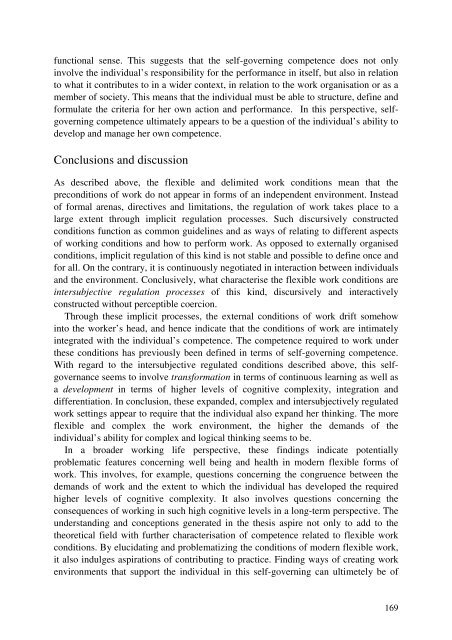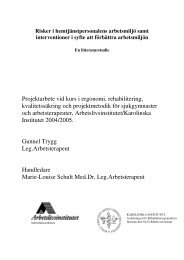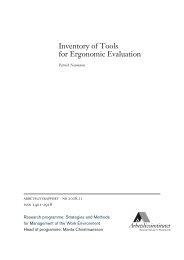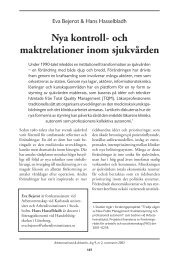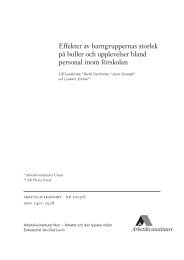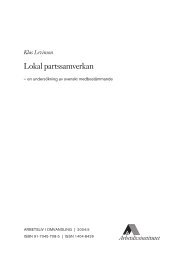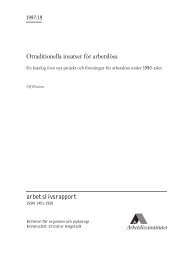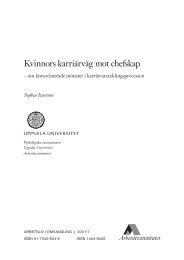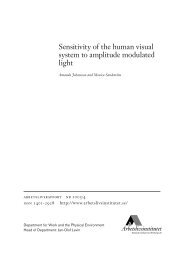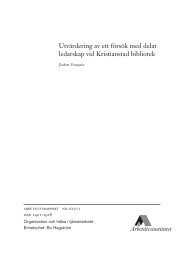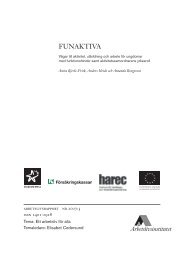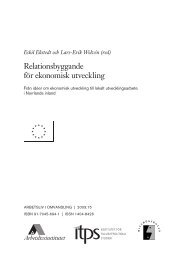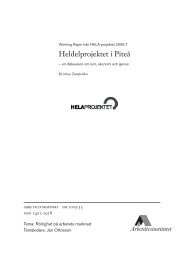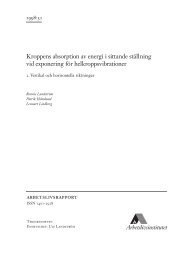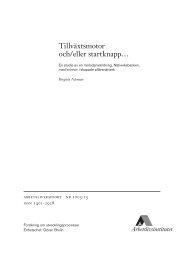Det flexibla arbetets villkor â om ... - Lunds universitet
Det flexibla arbetets villkor â om ... - Lunds universitet
Det flexibla arbetets villkor â om ... - Lunds universitet
- No tags were found...
You also want an ePaper? Increase the reach of your titles
YUMPU automatically turns print PDFs into web optimized ePapers that Google loves.
functional sense. This suggests that the self-governing c<strong>om</strong>petence does not onlyinvolve the individual’s responsibility for the performance in itself, but also in relationto what it contributes to in a wider context, in relation to the work organisation or as amember of society. This means that the individual must be able to structure, define andformulate the criteria for her own action and performance. In this perspective, selfgoverningc<strong>om</strong>petence ultimately appears to be a question of the individual’s ability todevelop and manage her own c<strong>om</strong>petence.Conclusions and discussionAs described above, the flexible and delimited work conditions mean that thepreconditions of work do not appear in forms of an independent environment. Insteadof formal arenas, directives and limitations, the regulation of work takes place to alarge extent through implicit regulation processes. Such discursively constructedconditions function as c<strong>om</strong>mon guidelines and as ways of relating to different aspectsof working conditions and how to perform work. As opposed to externally organisedconditions, implicit regulation of this kind is not stable and possible to define once andfor all. On the contrary, it is continuously negotiated in interaction between individualsand the environment. Conclusively, what characterise the flexible work conditions areintersubjective regulation processes of this kind, discursively and interactivelyconstructed without perceptible coercion.Through these implicit processes, the external conditions of work drift s<strong>om</strong>ehowinto the worker’s head, and hence indicate that the conditions of work are intimatelyintegrated with the individual’s c<strong>om</strong>petence. The c<strong>om</strong>petence required to work underthese conditions has previously been defined in terms of self-governing c<strong>om</strong>petence.With regard to the intersubjective regulated conditions described above, this selfgovernanceseems to involve transformation in terms of continuous learning as well asa development in terms of higher levels of cognitive c<strong>om</strong>plexity, integration anddifferentiation. In conclusion, these expanded, c<strong>om</strong>plex and intersubjectively regulatedwork settings appear to require that the individual also expand her thinking. The moreflexible and c<strong>om</strong>plex the work environment, the higher the demands of theindividual’s ability for c<strong>om</strong>plex and logical thinking seems to be.In a broader working life perspective, these findings indicate potentiallyproblematic features concerning well being and health in modern flexible forms ofwork. This involves, for example, questions concerning the congruence between thedemands of work and the extent to which the individual has developed the requiredhigher levels of cognitive c<strong>om</strong>plexity. It also involves questions concerning theconsequences of working in such high cognitive levels in a long-term perspective. Theunderstanding and conceptions generated in the thesis aspire not only to add to thetheoretical field with further characterisation of c<strong>om</strong>petence related to flexible workconditions. By elucidating and problematizing the conditions of modern flexible work,it also indulges aspirations of contributing to practice. Finding ways of creating workenvironments that support the individual in this self-governing can ultimetely be of169


